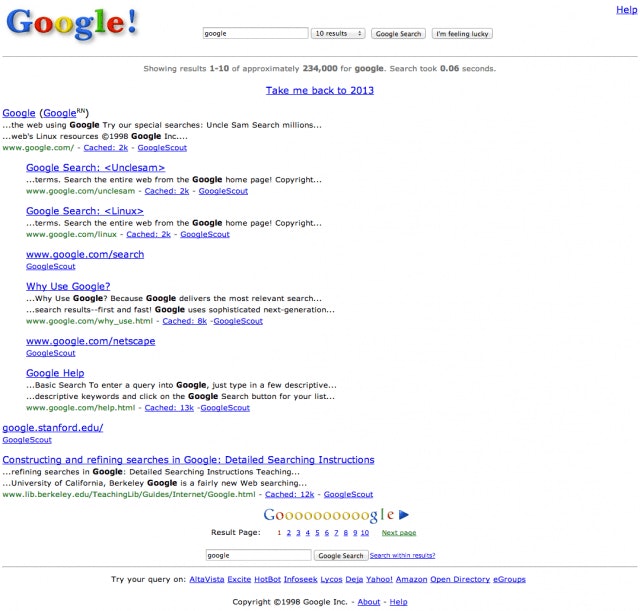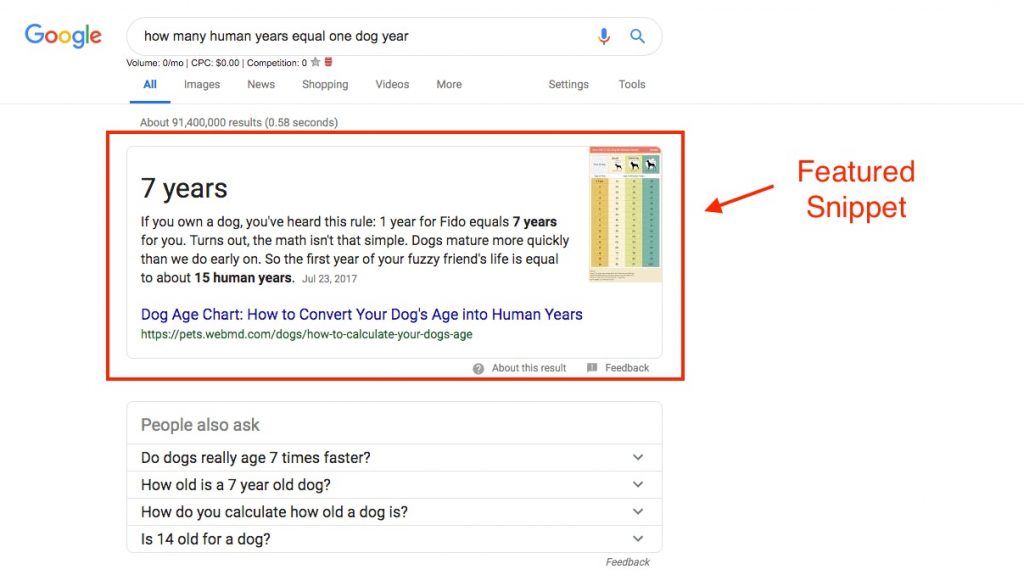Many marketers and business owners bemoan SEO because they think of it as a thing to be conquered or a power play from Google that doesn’t tell you how to beat it. This perception and perspective leads many people to think SEO is a game to be manipulated. Then, businesses who try to manipulate search rankings by exploiting loopholes end up being washed away by algorithm changes.
Good for Google.
Google has the same problems we all do in the digital universe: figuring out how to stay relevant in the face of users’ changing habits and evolving technology.
For search in particular, staying relevant means Google needs to constantly up its game to reflect what users are doing and make their search results useful and usable. (Google search rarely sets the trend—it’s more of a final recognition of a consistent pattern.)
Because of all that, SEO is not about manipulating the algorithm rules—SEO is about providing the best possible experience for your users so that Google can provide the best possible experience for its users and, ultimately, serve the larger internet as best as possible. Which brings us to…
Your SEO mantra: Play well with others.
While it may seem overly simple or trite, playing well with others is the binding principle behind all my SEO decisions. The idea developed over the course of my digital career—playing well with others is the one thing I’ve seen, time and time again, that protects companies against algorithm changes they didn’t see coming. Why? Because if you’re doing the right thing on the web (good usability, clean code, share your expertise, etc.), you are the exact type of site that Google wants to feature more, not less. No matter what algorithm they use to get there, it’s what they’re always going to be looking for.
The companies that get in SEO trouble are those that try to game the system or don’t have a great online presence in general. If you try to rank higher simply for the sake of ranking higher to beat the system, Google will sniff out your tricks and change the algorithm, and your castle of sand will be washed to the sea.
Again: good for Google.
That seems harsh, Jeff.
Maybe. But, consider: Google organizes what would otherwise be an unholy, unnavigable mess of information resembling nothing of the modern web we enjoy today. If you are over the age of 30, you probably remember what web search used to be like. Search results were so bad and riddled with pornographic results, the long-term economic and existential viability of the internet was honestly questionable. Google fixed the overall usability of the internet and set a course for its long-term viability with their search algorithm. Seriously.
Google Search Results, 1998
At each step, Google’s algorithm changes have been about providing a better user experience for the users of the internet and trying to feature more relevant content. Yes, sometimes they throw down the gauntlet (“mobilegeddon”), and sometimes they make a misstep or experiment a little too much. But, all in all, everything Google does is about making search results as relevant as possible so people can use the internet effectively and easily. End of story.
Google also provides an organic search service for free. (I know, they base the rest of their business on organic search, but still…organic is free.)
If you consistently do the right thing to give people the best possible online experience, if you don’t worry about others too much, and you keep doing the right thing over and over by serving your audience, serving your people, and being a part of Team Internet, the arc of internet justice will bend in your favor.
Examples of being a good internet steward
Ways to be part of Team Internet:
Clean it up
If you clean up your site code and design so the site can be navigated more easily by users, then great! By cleaning up the code and design, you have helped Google understand your site and what you offer better, you’ve made it easier for them to serve that information to searchers, and you are generally providing a better experience online.
Share your knowledge
If you have expertise in a subject and want to share it with the world, you can put it on your site, share it out, gain a following, and foster the community. Google appreciates expertise, and they notice all the links to your site, your following on social media, and your overall growing brand presence. Google will find you and place you higher in the results.
Improve website hierarchy and more
Your site works fine on mobile, but it could be better. So you redesign the site to be more functional and have a cleaner hierarchy. You kill off duplicate content that confuses Google, set up redirects for the old pages, and Google thanks you because you have helped make the Internet a better place today.
If this all sounds corny, I get it. It probably is. But that doesn’t change the fact that it’s true.
With that, here are some trends to help you play well with others. If you think about playing well with others, none of these should be surprising. SEO reflects user habits and if you’re thinking about serving your audience, you need to be thinking about these things.
2019 SEO Trends, Happenings, and Must-haves Worth Noting
1. Featured Snippets
Featured snippets are often used for audio-based search results, and they also offer an awesome user experience for the text-based search result.
To raise your chances of winning the snippet box, create a compelling summary of your focused-content page near the top of the page.
Play well with others
Better on-page content hierarchy is a better user experience and that equals a better chance of becoming a featured snippet.
2. Voice Search
By 2020, half of all internet searches will be voice-based. Naturally, Google is following this trend (they’re also helping to set it with Google Home). They’d be foolish to ignore it and so would you.
Think about using more natural language in the text on your website. For instance, an FAQ page with questions written and answered how people speak is a great start.
Play well with others
Help people out by being sensitive to how many are using voice for search and optimizing your website for it.
3. Structured data/markup—Schema.org
Everyone from Abraham Lincoln (“A house of data unstructured cannot stand.”) to King Joffrey (“I love torturing pages with unstructured data. Also, I love torture.”) agrees that you must have structured data on your page.
In an SEO context, “structured data” usually refers to implementing markup on a webpage in order to provide additional detail around the page’s content. Moz has an awesome starter course on structured data, and here’s a killer glossary of structured data terms.
Play well with others
Google and the other major search engines are trying to deliver a richer, more relevant user experience and will reward those that help them do so. Structured data offers you the opportunity to create clear, clean markup that helps people more easily find what they need online. And that’s Google’s favorite thing.
4. Quality content and site depth
Content never stops being trendy. Content is in the core DNA of SEO. Good content shows expertise. Expertise builds backlinks and traffic. Backlinks and traffic build your online brand. Google sees you as an authority people trust and rewards you with higher search rankings.
In my experience, great content is the biggest panacea for all SEO problems. I can’t imagine a day where Google will punish a site for having great content and being seen as an authority. Sure, Google might change some technical aspects of SEO for algorithmic differences, but if you have well-produced content on a well-designed site and people trust you, those differences are of much lesser concern and may even benefit you.
Finally, your overall online brand presence is a key signal for Google. The more expansive your footprint across the web, the better your search rankings will be.
Play well with others
Share your expertise. Be a part of the community and help The Googs send people to a place they can trust.
5. Site speed—as mobile-friendly as possible
Google loves site speed. They love site speed because most of the world isn’t on high-speed internet. They are way more likely to be on an old network on an older phone, and those users want to access the same information as everyone else. Accessing the information might even be a human right. On top of all that, a fast-loading site is just a nice courtesy to everyone who uses the internet, even if they’re flush with bandwidth.
Play well with others
If you need this one spelled out, I don’t know what to tell you.
Simply do your part
Google’s business model is based on being a steward of the broader internet with an objective of serving the most relevant information gleaned from all the possibilities across the web. It’s not an easy chore. Google can’t provide the appropriate content people need to fulfill their goals, dreams, and desires without a complex algorithm.
Ultimately, all Google is asking you to do is to do your part to help others: focus on providing the best user experience possible, share your expertise with the world, and don’t try to game the system. If you focus on doing that, the smaller algorithmic changes become less worrisome and your business can blossom. In short, just play well with others.







